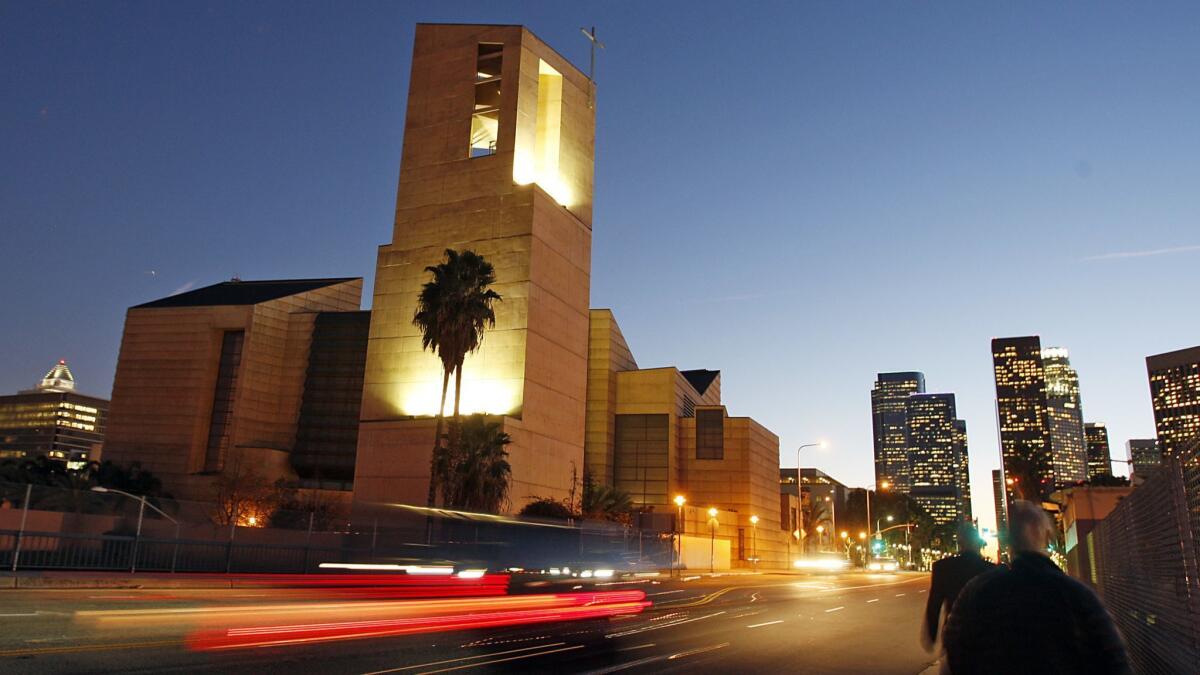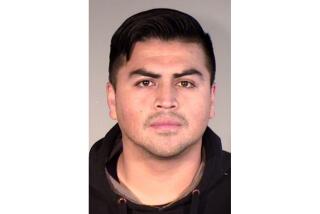L.A. Archdiocese’s handling of sex abuse cases under investigation by attorney general

The state attorney general’s office will review how the Catholic Archdiocese of Los Angeles handled sexual abuse allegations over the last two decades in a probe that victims advocates say could send shock waves through the religious institution.
A letter, dated Thursday, from Atty. Gen. Xavier Becerra to Archbishop Jose H. Gomez requests that church officials preserve an array of documents related to clergy abuse allegations.
“The California Department of Justice is conducting a review of your archdiocese’s handling of sexual misconduct allegations involving children, including whether your archdiocese has adequately reported allegations of sexual misconduct, as required under California’s Child Abuse and Neglect Reporting Act,” Becerra stated in the letter, reviewed by The Times.
The investigation marks a major escalation in the widespread abuse scandal, which has resulted in massive settlements for victims and criminal charges against individual priests statewide but has stopped short of targeting the larger institution.
“The people I represent and survivors in general are just thrilled,” Sacramento attorney Joseph George said. “I love the idea that law enforcement would come in with warrants and subpoena power and really get things done.”
George said he’s worked with abuse survivors since late last year to file more than 100 reports of abuse involving clergy in Los Angeles, Oakland, Santa Rosa, Fresno, San Diego and Monterey with the attorney general’s office.
“The hope is that the hierarchy will be held accountable and the conduct will be conveyed to the public,” he said. “They keep talking about apologies and evil and mistakes and sins, but what we’re really talking about are crimes that were made by more than just bad apples.”
In November, Becerra asked people who believe they had been sexually abused by clergy members in California to come forward, but it wasn’t clear how exactly that information was going to be used.
It’s also unclear whether Becerra’s office is seeking records from other California dioceses. However, one source told The Times that other dioceses were being contacted by the attorney general. A spokesperson from the attorney general’s office declined to comment Friday.
A spokeswoman for the Los Angeles Archdiocese said in a statement that they had not yet received the letter from the attorney general’s office but plan to respond “cooperatively as we have with the past three Grand Jury investigations of the archdiocese.”
“The Archdiocese of Los Angeles is committed to transparency and has established reporting and prevention policies and programs to protect minors and support victim-survivors in our parishes, schools and ministries,” the statement said. “The Archdiocese was one of the first dioceses in the nation to publish a comprehensive report in 2004 listing accused clergy both living and deceased, and released clergy files as part of a 2007 global settlement.”
For nearly two decades, the archdiocese has been roiled by allegations that onetime church leaders mishandled clergy abuse cases, sometimes moving clergy suspected of wrongdoing to other parishes rather than punishing them and informing law enforcement.
The L.A. Archdiocese has paid a record $740 million in various settlements to victims and pledged to better protect its church members. Gomez succeeded longtime Cardinal Roger M. Mahony, who faced strong criticism for his handling of the scandal that undercut his moral authority as one of America’s most important Roman Catholic leaders. In the wake of the settlement, the church imposed a series of reforms.
“Allegations of abuse involving minors whether by a member of the clergy or a layperson are reported to law enforcement, public announcements are made at the places where the person has served, and if found credible the person is permanently removed from any capacity according to the Archdiocese’s Zero Tolerance policy,” the archdiocese said in a statement.
Other state attorneys general have launched Catholic clergy abuse investigations in the wake of a series of new scandals in the last year, including a Pennsylvania report that revealed a decades-long cover-up of child sex abuse involving more than 1,000 victims and hundreds of clergy.
An Illinois attorney general’s report released in December found that the number of Catholic clergy accused of sexual abuse in that state was much higher than previously acknowledged. The report found 690 clergy accused, although church officials had publicly identified only 185 with credible allegations against them. Churches in California and elsewhere across the nation responded by releasing previously undisclosed names of clergy accused of abuse.
While other states’ attorneys general have requested or subpoenaed dioceses’ records on clergy, Becerra’s request goes further in its solicitation of records about cases involving non-clergy personnel, such as volunteers and staffers.
According to the letter, Becerra is seeking records from the archdiocese that include all allegations of sexual misconduct with minors that the archdiocese received from 1996 to present, regardless of when the misconduct took place, along with any actions taken during that time period against any individual who was accused or who failed to report allegations to law enforcement.
Becerra is also asking for records that show which individuals have been accused of sexual misconduct and are still active in the ministry, along with reports of alleged sexual misconduct toward a minor filed by the archdiocese in compliance with the law from 1996 to the present.
The office is seeking to review all policies, procedures, documents or communications regarding the archdiocese’s compliance with state laws and any documents maintained by the organization about individuals accused of sexual molestation of a minor including “secret archives,” personnel files, litigation files, and victim or review board files.
Attorney Anthony De Marco, who helped secure the $740 million in settlements, said it’s encouraging the attorney general is investigating but too soon to tell what will come of it.
“I am a little more measured, as time and time again law enforcement agencies have talked of actions and nothing has come of it in terms of the church’s higher-up figures and their behavior,” he said.
Former L.A. County Dist. Atty. Steve Cooley, who as the county’s top prosecutor charged two dozen priests and used a grand jury to extract records from the archdiocese, said the probe may generate more information, as it did in Pennsylvania, but criminal charges are much harder to lodge against the church hierarchy.
Cooley said that because the Los Angeles Archdiocese delayed and blocked disclosure, the efforts to hold church officials accountable have been stymied.
“Conspiracy charges are based on the last overt act. The statute for conspiracy is based on the underlying crime,” Cooley said. “Here that could be obstruction of justice, and that is just a few years.”
In December, the L.A. Archdiocese updated its list of clergy accused of molesting children, for the first time in a decade. Of the 54 names previously undisclosed by L.A. church leaders, the vast majority were clergy members accused of wrongdoing before 2008, the last time the archdiocese updated the list. At least 27 are dead.
The Times reported in December that the archdiocese knew for at least 13 years that one of its bishops, Alexander Salazar, had been accused of sexual abuse at a parish but had not informed the public until December, despite repeated pledges to disclose such information.
Salazar’s name was not on several lists released by the church, even though he’d been investigated by the Pasadena Police Department in 2002 regarding an allegation that he committed a lewd act with a child in the 1990s.
Despite the investigation, Pope John Paul II elevated Salazar to the position of bishop in 2004. The archdiocese said its officials were not informed about the Pasadena investigation until 2005, but police said some in the church may have known sooner.
The inquiry involving Salazar only became public when Pope Francis accepted his resignation in December as auxiliary bishop of Los Angeles. Salazar, who has maintained his innocence, was not charged.
Archdiocese officials have said the church has made great strides to prevent abuse and to work with law enforcement. However, the L.A. Archdiocese in April announced a record $8-million settlement with a former Catholic school student, now 18, who was molested by a coach. It was the largest individual settlement by the archdiocese in a sex abuse case. Her attorney said concerns about the teacher’s conduct were ignored.
In 2009, the U.S. attorney in Los Angeles launched a federal grand jury investigation into Mahony and the church’s handling of abuse allegations. The investigation did not result in any criminal charges.
Laureen Vonnegut, 55, who was abused by a priest in Monterrey when she was 10 years old, said she hopes the attorney general’s investigation will hold Catholic leaders accountable for their failure to act when they were confronted with allegations of abuse.
“What the priests did is awful, but the fact it was covered up and [victims] were dismissed makes the leadership co-conspirators. They’re just as bad,” she said. “What happened to being defrocked and jail time? For so long it’s been like the church is something no one can touch.”
Times staff writer Kim Christensen contributed to this report.
More to Read
Sign up for Essential California
The most important California stories and recommendations in your inbox every morning.
You may occasionally receive promotional content from the Los Angeles Times.












